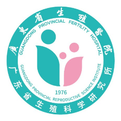Why do some people gain weight just by drinking cold water,
while others “don’t gain weight even if they soak in an oil vat”?
Why do some feel hot in the same air-conditioned room,
while others feel cold?
Why are some people slow and steady,
while others are quick and fiery?
These are closely related to constitution.

According to different clinical manifestations and characteristics, TCM classifies constitution into ten categories: Qi deficiency (气虚), Yin deficiency (阴虚), Yang deficiency (阳虚), Blood deficiency (血虚), Qi stagnation (气郁), Damp-heat (湿热), Phlegm-damp (痰湿), Blood stasis (瘀血), Special constitution (特禀), and Balanced constitution (平和体质). Different constitutions can be adjusted using corresponding medicinal diets or tea formulas to assist medicinal effects or prevent diseases.
In the previous issue, the editor from Guangdong Reproductive Hospital invited Dr. Cui Shichao from our hospital to discuss the identification and adjustment of Qi deficiency constitution.
Details: TCM teaches you to identify and adjust constitution to assist pregnancy, Qi deficiency constitution adjustment.
This time, let’s take a look at what Yin deficiency constitution is and how to adjust it?

What should friends with Yin deficiency constitution eat?
Main characteristics of Yin deficiency constitution
The main characteristics of Yin deficiency constitution include: relatively thin body type, prone to “generate empty heat”, hot palms and soles, flushed cheeks, irritable temperament, dry mouth and throat, night sweats, and dry stools. The tongue is red and dry with little coating, and the pulse is thin and rapid.
Dietary therapy principles
Nourish Yin and support Yin.
Recommended dietary therapies
1. Sha Shen (Adenophora) and Yu Zhu (Polygonatum) Soup with Lean Meat
Ingredients:
20g Sha Shen, 20g Yu Zhu, 10g Mai Dong (Ophiopogon), 400g lean pork, 2 figs, 3 slices of ginger.
Method:
① Clean the lean pork, cut into pieces, blanch in water, and set aside the other ingredients. ② Place all ingredients in a soup pot, add appropriate amount of water, bring to a boil over high heat, then simmer on low heat for 2 hours, season, and serve.
Characteristics:
Sha Shen nourishes Yin, clears the lungs, and benefits the stomach; Yu Zhu nourishes Yin, moistens dryness, and alleviates thirst. This soup is clear and sweet, nourishing Yin and generating fluids, clearing the lungs and moistening dryness.
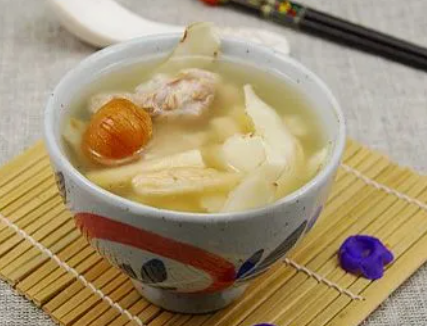
2. Tai Zi Shen (Pseudostellaria) and Bai He (Lily Bulb) Soup with Lean Meat
Ingredients:
30g Tai Zi Shen, 20g Bai He, half a small Luo Han Guo (Siraitia grosvenorii), 400g lean pork, 3 slices of ginger.
Method:
① Clean the lean meat, cut into pieces, blanch in water; clean Tai Zi Shen, Bai He, and Luo Han Guo. ② Place all ingredients in a soup pot, add appropriate amount of water, bring to a boil over high heat, then simmer on low heat for 2 hours, season, and serve.
Characteristics:
Tai Zi Shen is neutral in nature, sweet and slightly bitter, functions to tonify the lungs, strengthen the spleen, and generate fluids; Bai He is sweet and slightly cold, can moisten the lungs, stop cough, and calm the mind; Luo Han Guo is sweet and sour, cool in nature, has effects of clearing heat, cooling blood, generating fluids, stopping cough, and resolving phlegm. This soup has the effects of tonifying Qi, generating fluids, and moistening the lungs, suitable for all types of people, especially those with Qi deficiency and lung dryness who experience cough, shortness of breath, and dry mouth and throat.
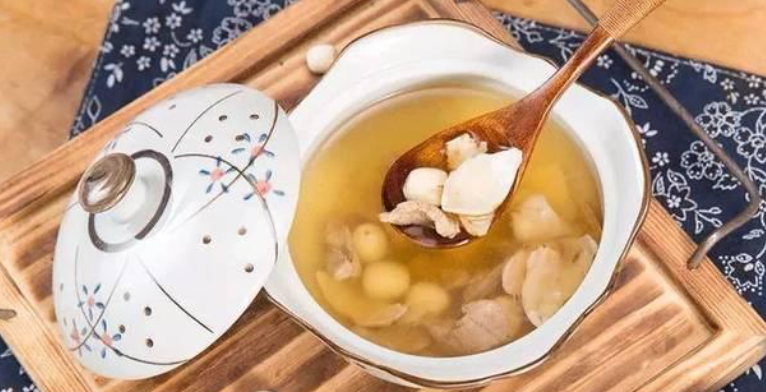
3. Shu Di Huang (Rehmannia) and Goji Berry Tea
Ingredients:
10g Shu Di Huang, 10g Goji Berries.
Method:
Infuse with boiling water and drink.
Characteristics:
Shu Di Huang is good for nourishing kidney Yin, and Goji Berries nourish the liver and kidneys. The combination of these two herbs strongly nourishes Yin and supports the kidneys, and long-term consumption can improve Yin deficiency constitution.
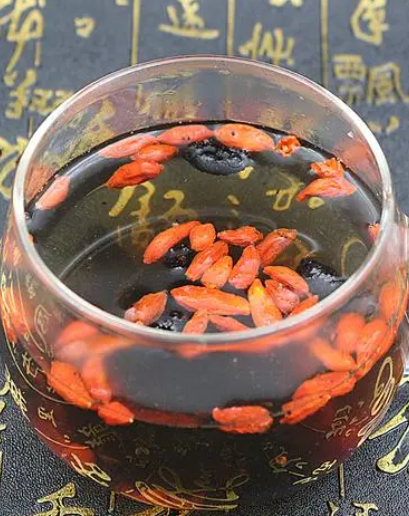
4. Shi Hu (Dendrobium) and Yu Zhu (Polygonatum) Tea
Ingredients:
10g Shi Hu, 15g Yu Zhu.
Method:
Boil with water and drink.
Characteristics:
Shi Hu nourishes the kidneys, supports the stomach, and brightens the eyes; Yu Zhu nourishes the Yin of the lungs and stomach. The combination of these two herbs has the effect of nourishing Yin and benefiting the stomach.


Warm Reminder
Generally, drink soup before meals, and the amount should not be too large, a small bowl is appropriate. Use cold water for soup preparation, and add boiling water for stewing. If you cannot accurately determine your constitution and symptoms, you should choose soup formulas under the guidance of a TCM physician.
Soup formulas are not fixed and differ from medicinal prescriptions; they should taste good to ensure long-term consumption, and can be adjusted according to individual conditions.
Cui Shichao
Doctor of TCM Gynecology
Attending Physician
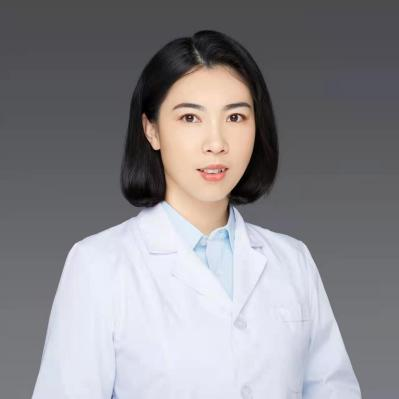
Expert Introduction
Trained under a nationally renowned TCM physician, a leading figure in TCM, and a representative inheritor of the Lingnan Luo School of Gynecology, Professor Luo Songping. Member of the Non-Material Cultural Heritage Protection Committee of the Guangdong Provincial Association of Traditional Chinese Medicine, and the Reproductive Immunology Committee of the China Human Health Technology Promotion Association. Participated in two national medical research funds and published multiple papers in SCI and core journals.
Specialties
Pre-pregnancy conditioning to assist conception, improving endocrine, pelvic, and immune factors, TCM combined with assisted reproduction, maintaining pregnancy after conception, and postpartum conditioning.
Consultation Hours
Monday to Friday all day, Sunday morning
Consultation Location
Room 303, 3rd Floor, Outpatient Building 1
Contact Information

Scan the WeChat to consult with me
-END-
Written by: Cui Shichao
Reviewed by: Zhong Xingming, Zhang Jing
Approved by: Huang Weibiao
Typeset and Edited by: Cai Jiaqi
|Introduction to Guangdong Reproductive Hospital|
Guangdong Reproductive Hospital (Guangdong Reproductive Science Research Institute) is the only provincial-level public tertiary reproductive specialty hospital in Guangdong Province. It has specialized departments including reproductive medicine, andrology, gynecology, genetic counseling, reproductive immunology, reproductive endocrinology, TCM reproductive health, and reproductive health check-ups, with the only National Health Commission Key Laboratory of Male Reproductive and Genetic Health in Guangdong Province, and the only human sperm bank in the province, providing comprehensive and refined reproductive assistance services. To date, it has completed over 40,000 cycles of artificial insemination and over 15,000 cycles of in vitro fertilization, successfully giving birth to nearly 20,000 children.
Hospital Address:
17 Mei Dong Road, Yuexiu District, Guangzhou, Guangdong Province
Official Website:
https://www.gdszjk.org.cn/
Consultation Phone:
020-87777331

Focus on reproductive health
Build a happy family

